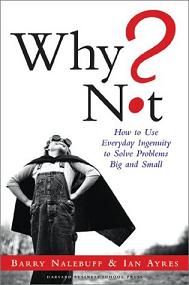
The other day, my foster brother Seth and I were speaking about being innovative. Seth is a lead test engineer on a certain eXcellent gaming console in Redmond, WA.
"I don't think I have it in me," Seth commented, "I can almost always figure out how things work, like noise canceling headsets for example, but I don't know how people come up with those ideas in the first place."
"Maybe that's true," I responded, "but I bet that you could be trained."
I like to tell people that creating something innovative and new is like pulling on threads until it leads you to a sweater, or even better yet, it's like gathering threads into your hands until you finally realize that you're already holding a sweater. In non-knitting terms, innovation is an organic process, involving questions and observations, and a lot of looking at the world differently. And one of my favorite guides for looking at the world differently is Barry Nalebuff's and Ian Ayres' "Why Not? How to Use Everyday Ingenuity to Solve Problems Big and Small"
In twenty years and countless adventures in growing our business, our only progress and for that matter our only interesting breakthroughs have resulted from someone asking Why not? Nalebuff and Ayres have crafted an inspiring, imaginative, informative and best of all, fun treatise that will arouse the entrepreneur in all of us. You will fly through this book, and you will never look at a problem the same way again.
—Gary Hirshberg, President and CEO,Stonyfield Farm Yogurt, Inc.